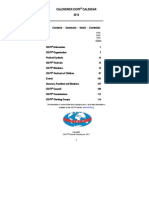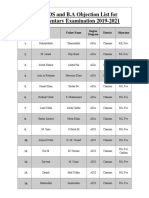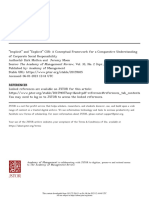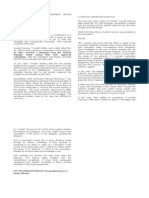Germany
Germany
Uploaded by
SC14Copyright:
Available Formats
Germany
Germany
Uploaded by
SC14Copyright
Available Formats
Share this document
Did you find this document useful?
Is this content inappropriate?
Copyright:
Available Formats
Germany
Germany
Uploaded by
SC14Copyright:
Available Formats
Germany
or other uses, see Germany (disambiguation).
"Deutschland" redirects here. For other uses, see Deutschland (disambiguation).
"Federal Republic of Germany" redirects here. For the republic from 1949 to 1990,
see West Germany. For the republic since 1990, see History of Germany (1990–present).
Coordinates: 51°N 9°E
Federal Republic of Germany
Bundesrepublik Deutschland (German)
Flag
Coat of arms
Anthem: Deutschlandlied[a]
"Song of Germany"
1:15
Show globe Show map of Europe Show all
Location of Germany (dark green)
– in Europe (light green & dark grey)
– in the European Union (light green)
Capital Berlin[b]
and largest city 52°31′N 13°23′E
Official language German[c]
Demonym(s) German
Government Federal parliamentary republic
• President Frank-Walter Steinmeier
• Chancellor Olaf Scholz
Legislature Bundestag, Bundesrat[d]
Formation
• Unification 18 January 1871
• Monarchy abolished 9 November 1918
• Nazi Germany 23 March 1933
• West–East division [e]
7 October 1949
• Reunification 3 October 1990
Area
• Total 357,022 km2 (137,847 sq mi)[4] (63rd)
• Water (%) 1.27 (2015)[5]
Population
• 2022 estimate 83,695,430 [6] (19th)
• Density 232/km2 (600.9/sq mi) (58th)
GDP (PPP) 2022 estimate
• Total $5.317 trillion[7] (5th)
• Per capita $63,835[7] (18th)
GDP (nominal) 2022 estimate
• Total $4.031 trillion[7] (4th)
• Per capita $48,398[7] (20th)
Gini (2020) 30.5[8]
medium
HDI (2021) 0.942[9]
very high · 9th
Currency Euro (€) (EUR)
Time zone UTC+1 (CET)
• Summer (DST) UTC+2 (CEST)
Driving side right
Calling code +49
ISO 3166 code DE
Internet TLD .de
Germany (German: Deutschland, pronounced [ˈdɔʏtʃlant] ( listen)), officially the Federal
Republic of Germany,[f] is a country in Central Europe. It is the second most populous
country in Europe after Russia, and the most populous member state of the European
Union. Germany is situated between the Baltic and North seas to the north, and the Alps to
the south; it covers an area of 357,022 square kilometres (137,847 sq mi), with a
population of almost 84 million within its 16 constituent states. Germany
borders Denmark to the north, Poland and the Czech Republic to the
east, Austria and Switzerland to the south, and France, Luxembourg, Belgium, and
the Netherlands to the west. The nation's capital and most populous city is Berlin and its
financial centre is Frankfurt; the largest urban area is the Ruhr.
Various Germanic tribes have inhabited the northern parts of modern Germany
since classical antiquity. A region named Germania was documented before AD 100. In
962, the Kingdom of Germany formed the bulk of the Holy Roman Empire. During the 16th
century, northern German regions became the centre of the Protestant Reformation.
Following the Napoleonic Wars and the dissolution of the Holy Roman Empire in 1806,
the German Confederation was formed in 1815. In 1871, Germany became a nation-state
when most of the German states unified into the Prussia-led German Empire. After World
War I and the German Revolution of 1918–1919, the Empire was replaced by the semi-
presidential Weimar Republic.
The Nazi seizure of power in 1933 led to the establishment of a totalitarian
dictatorship, World War II, and the Holocaust. After the end of World War II in Europe and a
period of Allied occupation, Germany was divided into the Federal Republic of Germany,
generally known as West Germany, and the German Democratic Republic, East Germany.
The Federal Republic of Germany was a founding member of the European Economic
Community and the European Union, while the German Democratic Republic was a
communist Eastern Bloc state and member of the Warsaw Pact. After the fall of
communism, German reunification saw the former East German states join the Federal
Republic of Germany on 3 October 1990—becoming a federal parliamentary republic.
Germany is a great power with a strong economy; it has the largest economy in Europe,
the world's fourth-largest economy by nominal GDP and the fifth-largest by PPP. As a
global power in industrial, scientific and technological sectors, it is both the world's third-
largest exporter and importer. As a highly developed country, which ranks ninth on
the Human Development Index, it offers social security and a universal health care system,
environmental protections, a tuition-free university education, and it is ranked as sixteenth-
most peaceful country in the world. Germany is a member of the United Nations, the
European Union, NATO, the Council of Europe, the G7, the G20 and the OECD. It has
the third-greatest number of UNESCO World Heritage Sites.
You might also like
- Base Carbon: Initiating Coverage With An Outperform (Speculative) RatingDocument23 pagesBase Carbon: Initiating Coverage With An Outperform (Speculative) RatingJim McIntyreNo ratings yet
- CIOFF® Festivals Calendar 2012Document119 pagesCIOFF® Festivals Calendar 2012Caarlos TrzNo ratings yet
- fw4 DFTDocument5 pagesfw4 DFTCNBC.comNo ratings yet
- 7 Module 3-Brand Building Through Imperative, Global and Corporate ImageDocument31 pages7 Module 3-Brand Building Through Imperative, Global and Corporate ImageSarang KulkarniNo ratings yet
- AnhnguLea-E8-Ôn tập GK2Document27 pagesAnhnguLea-E8-Ôn tập GK2Đình KIên NguyễnNo ratings yet
- 9-19-22 BeerDocument1 page9-19-22 BeerPringles Fine WineNo ratings yet
- Boating NZ 12.2021Document164 pagesBoating NZ 12.2021Anantoly KoretskyNo ratings yet
- Chcolate Project - Five BrandsDocument46 pagesChcolate Project - Five BrandsNitinAgnihotriNo ratings yet
- Brigada AcrDocument3 pagesBrigada AcrArnold CabanerosNo ratings yet
- 1 s2.0 S2666138122000433 MainDocument18 pages1 s2.0 S2666138122000433 MainAnca TomaNo ratings yet
- Billboard 2019 08 10Document92 pagesBillboard 2019 08 10Rafael TexeiraNo ratings yet
- India-China-Relations-Shubra Ranjhan Mam NotesDocument63 pagesIndia-China-Relations-Shubra Ranjhan Mam NotesAaira TanveerNo ratings yet
- Agriculture Padhai Online ClassesDocument18 pagesAgriculture Padhai Online ClassesYogita SharmaNo ratings yet
- Using Multicast HammerDocument5 pagesUsing Multicast HammerjavaaidNo ratings yet
- UAW Ford Contract SummaryDocument24 pagesUAW Ford Contract SummaryCourier JournalNo ratings yet
- This Content Downloaded From 90.120.46.220 On Fri, 01 Oct 2021 17:26:25 UTCDocument9 pagesThis Content Downloaded From 90.120.46.220 On Fri, 01 Oct 2021 17:26:25 UTCAbdifatah MohamedNo ratings yet
- Summoning Osean FederationDocument128 pagesSummoning Osean FederationRadja RadjaNo ratings yet
- AL Chemistry I A+ ExamDocument10 pagesAL Chemistry I A+ Examjoker boyNo ratings yet
- Каталог Gedore 2012 EN PDFDocument692 pagesКаталог Gedore 2012 EN PDFСергей ЧабанNo ratings yet
- PM Street Vendor'S Atmanirbhar Nidhi (PM Svanidhi) : PhotoDocument2 pagesPM Street Vendor'S Atmanirbhar Nidhi (PM Svanidhi) : Photolaxmi sambreNo ratings yet
- SOAL SMP KELAS 7 Semester 1 Materi Introduction-DikonversiDocument8 pagesSOAL SMP KELAS 7 Semester 1 Materi Introduction-DikonversiHilma RahmiNo ratings yet
- Livrando-Se Da CybersicknessDocument48 pagesLivrando-Se Da CybersicknessThiago MalheirosNo ratings yet
- Census of India 2011-Census of India 2011, National Population Register Socio Economic and Caste CensusDocument32 pagesCensus of India 2011-Census of India 2011, National Population Register Socio Economic and Caste CensusMaheshMangureNo ratings yet
- CHAPTER 1.5 Conic in PolarDocument5 pagesCHAPTER 1.5 Conic in PolarLi Ling TanNo ratings yet
- Segmentation, Targeting and Positioning: Unit IiiDocument38 pagesSegmentation, Targeting and Positioning: Unit IiiTHRIPTHI BNo ratings yet
- OSC Logistics CF - MM and E-Mirsal Test Scenarios and Test Cases TemplateDocument60 pagesOSC Logistics CF - MM and E-Mirsal Test Scenarios and Test Cases TemplateEn KirukalgalNo ratings yet
- 03 - Topology Optimization For Additive Manufacturing As An Enabler For Light Weight Flight HardwareDocument22 pages03 - Topology Optimization For Additive Manufacturing As An Enabler For Light Weight Flight HardwareKalyude DiógenesNo ratings yet
- Centre of Mass Uniform LaminaDocument12 pagesCentre of Mass Uniform LaminaAshish MishraNo ratings yet
- Mu Sigma Apps N Puzzles PDFDocument24 pagesMu Sigma Apps N Puzzles PDFVairavLakshmanan100% (1)
- Biographies and ContributionsDocument22 pagesBiographies and Contributionsbyrikishore ByriNo ratings yet
- 19. Đề thi thử THPTQG 2021 trường Nguyễn Viết Xuân Vĩnh Phúc Lần 1 có giải chi tiếtDocument20 pages19. Đề thi thử THPTQG 2021 trường Nguyễn Viết Xuân Vĩnh Phúc Lần 1 có giải chi tiếtbách tháiNo ratings yet
- Reclaiming Critical CriminologyDocument25 pagesReclaiming Critical CriminologyIván Ossandón CastilloNo ratings yet
- Merritt Morning Market 3810 - Mar 27Document2 pagesMerritt Morning Market 3810 - Mar 27Kim LeclairNo ratings yet
- Model Contract of Apprenticeship Training For Major/Minor ApprenticesDocument3 pagesModel Contract of Apprenticeship Training For Major/Minor ApprenticesTejashree patilNo ratings yet
- 7980-Enus-Ug Rev BDocument206 pages7980-Enus-Ug Rev BMaximo Gavira S.A.No ratings yet
- Templateword 2023-OUACSCE Journal-SciendoDocument5 pagesTemplateword 2023-OUACSCE Journal-Sciendoyram_anaNo ratings yet
- Open PositionsDocument9 pagesOpen PositionsAtheen GuptaNo ratings yet
- 2023 Riverside County Pension Advisory Review Committee ReportDocument24 pages2023 Riverside County Pension Advisory Review Committee ReportThe Press-Enterprise / pressenterprise.comNo ratings yet
- Patriot Way Brick WalkDocument20 pagesPatriot Way Brick WalkMichele MooreNo ratings yet
- Mathias Carricullum Vitea Bio DataDocument3 pagesMathias Carricullum Vitea Bio Datakatongole John MarkNo ratings yet
- Myanmar Gazette June 2017Document32 pagesMyanmar Gazette June 2017Myanmar GazetteNo ratings yet
- Teorija Optimalne Valutne Zone - Tradicionalni I Savremeni PristupDocument24 pagesTeorija Optimalne Valutne Zone - Tradicionalni I Savremeni PristupSylvesterNo ratings yet
- Potential Pathways For Decarbonizing China's Inland Waterway ShippingDocument4 pagesPotential Pathways For Decarbonizing China's Inland Waterway ShippingThe International Council on Clean TransportationNo ratings yet
- Lecture 9 Japan and ChinaDocument6 pagesLecture 9 Japan and ChinaNatala EtheringtonNo ratings yet
- Managing and Marketing in The Global ArenaDocument17 pagesManaging and Marketing in The Global ArenaPrashanthNo ratings yet
- Objection List BA BSC (ADA ADS)Document22 pagesObjection List BA BSC (ADA ADS)Rahmani BalochNo ratings yet
- Vikram Samvat - WikipediaDocument7 pagesVikram Samvat - Wikipediaanil kumarNo ratings yet
- Conformity Manual PDFDocument9 pagesConformity Manual PDFshyishNo ratings yet
- Online Kit For EmigrantDocument13 pagesOnline Kit For EmigrantMohamed ShafiNo ratings yet
- Pad240 Written AssignmentDocument26 pagesPad240 Written AssignmentMUHAMMAD AIMAN SYAHMI JANONNo ratings yet
- Public Speaking GuidelinesDocument2 pagesPublic Speaking GuidelinesSterling GuessNo ratings yet
- Academy of Management The Academy of Management ReviewDocument22 pagesAcademy of Management The Academy of Management ReviewLeoni BöselNo ratings yet
- Evidencia de InglesDocument6 pagesEvidencia de InglesLaura Ximena BarraganNo ratings yet
- План Урока По Английскому Языку На Тему - the Olympic GamesDocument6 pagesПлан Урока По Английскому Языку На Тему - the Olympic GamesAl'mira KyandukovaNo ratings yet
- Computer Networks Info-3201: Mcgraw-Hill ©the Mcgraw-Hill Companies, Inc., 2004Document121 pagesComputer Networks Info-3201: Mcgraw-Hill ©the Mcgraw-Hill Companies, Inc., 200422Angira GhoshNo ratings yet
- IJCRT2302547Document9 pagesIJCRT2302547Aparna SHARMANo ratings yet
- Jet Airways Financials 2019-20Document81 pagesJet Airways Financials 2019-20TriptiNo ratings yet
- Germany: Federal Republic of GermanyDocument5 pagesGermany: Federal Republic of GermanyANTHONY WAYNENo ratings yet
- Germany: Jump To Navigation Jump To SearchDocument5 pagesGermany: Jump To Navigation Jump To SearchNicolas Ferney BARRETO MARTINEZNo ratings yet
- East Germany DDS RAMDocument11 pagesEast Germany DDS RAMRonaldNo ratings yet
- IRCP 56: Revisions Recommended by Advancing Justice CommitteeDocument4 pagesIRCP 56: Revisions Recommended by Advancing Justice CommitteeMark ReinhardtNo ratings yet
- Grand Jury ResponseDocument2 pagesGrand Jury ResponseAnonymous EEAVziNgNo ratings yet
- UP 2012 Remedial Law (Criminal Procedure) PDFDocument65 pagesUP 2012 Remedial Law (Criminal Procedure) PDFAlvin Comila100% (1)
- Sankari Prasad Deo V Union of IndiaDocument6 pagesSankari Prasad Deo V Union of IndiaSachin LohiaNo ratings yet
- Bid Form: (Name of The Company or Individual Bidding On The Project)Document2 pagesBid Form: (Name of The Company or Individual Bidding On The Project)Brylee PascualNo ratings yet
- Chapter 3 Study Guide-Answer SheetDocument9 pagesChapter 3 Study Guide-Answer SheetAaron100% (1)
- Article USEP MusaDamaoDocument19 pagesArticle USEP MusaDamaoAbu HassanNo ratings yet
- Peace and Global EducationDocument23 pagesPeace and Global EducationAnnaliza GalvezNo ratings yet
- List of Political Parties ParticipatedDocument3 pagesList of Political Parties ParticipatedSundar GaneshNo ratings yet
- The Importance of Institutions To Economic DevelopmentDocument5 pagesThe Importance of Institutions To Economic DevelopmentPrakhardeep JainNo ratings yet
- Book Review - Pakistan - Failure in National IntegrationDocument2 pagesBook Review - Pakistan - Failure in National IntegrationTalukdar ManiruzzamanNo ratings yet
- The Causes of WW1 - IB History HL NotesDocument9 pagesThe Causes of WW1 - IB History HL NotesCyberdiz100% (3)
- ETH Presentation 7 Group 1Document17 pagesETH Presentation 7 Group 1Calvin Kim PeramanNo ratings yet
- Sociology 1101 Chapter 7 PowerpointlectureDocument56 pagesSociology 1101 Chapter 7 Powerpointlectureghata kunaNo ratings yet
- Syllabus: Teaching Hours:8 East India Company and Its Early Settlements in IndiaDocument11 pagesSyllabus: Teaching Hours:8 East India Company and Its Early Settlements in Indiashreyansh jainNo ratings yet
- Official Call To Action For UC Racial Equity LetterDocument3 pagesOfficial Call To Action For UC Racial Equity LetterWCPO 9 NewsNo ratings yet
- Planning Under Mixed EconomyDocument2 pagesPlanning Under Mixed EconomyYenna Noreen DomopoyNo ratings yet
- Input 9072Document4 pagesInput 9072Raghavendra PrabhuNo ratings yet
- 01 Francisco V GSISDocument2 pages01 Francisco V GSISSam Sy-HenaresNo ratings yet
- Dr. King: Martin Luther King Printable Reading Comprehension NameDocument2 pagesDr. King: Martin Luther King Printable Reading Comprehension NameLarbi Nadia100% (1)
- Survey Questionnaire 7.13.19Document2 pagesSurvey Questionnaire 7.13.19Gelli Muñoz Lamirez100% (1)
- UAPA (Unlawful Activity Prevention Act)Document2 pagesUAPA (Unlawful Activity Prevention Act)asim khanNo ratings yet
- Opposition To Motion - EmployeesDocument5 pagesOpposition To Motion - EmployeesDaily Caller News FoundationNo ratings yet
- Year Long Mains Test Series (YLM) 2022: 1. INSTA Preparatory Classes ScheduleDocument31 pagesYear Long Mains Test Series (YLM) 2022: 1. INSTA Preparatory Classes ScheduleKarthikeyan SivananthamNo ratings yet
- UPSC Civil Services Examination: UPSC Notes (GS-I) Topic: Bardoli Satyagraha (NCERT Notes)Document2 pagesUPSC Civil Services Examination: UPSC Notes (GS-I) Topic: Bardoli Satyagraha (NCERT Notes)rahul dadhichNo ratings yet
- Checklist of Requirements - BIR - Capital Gains TaxDocument1 pageChecklist of Requirements - BIR - Capital Gains TaxLRMNo ratings yet
- Aide Memoire - Pil - Jules GuzmanDocument9 pagesAide Memoire - Pil - Jules GuzmanJulius ManaloNo ratings yet
- Activity-Sheet-As in UCSP 2nd Quarter Sources of Political ChangeDocument2 pagesActivity-Sheet-As in UCSP 2nd Quarter Sources of Political ChangeQuarentai Siete Lpt100% (4)
- Intro To Sociology Chapter 1Document3 pagesIntro To Sociology Chapter 1musicalplayerNo ratings yet
- Dacoycoy Vs IACDocument2 pagesDacoycoy Vs IACPrincess Montañano SantiagoNo ratings yet

























































































